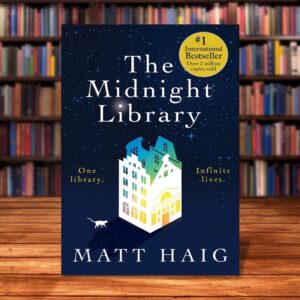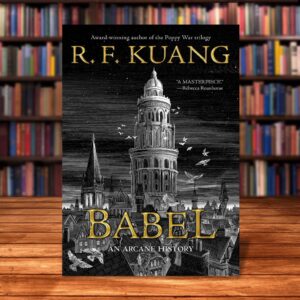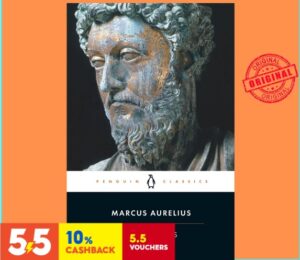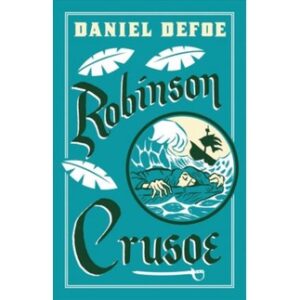Learning Book Club
Improve your English skills by learning from real quotes from famous novels and classic literature.
“The Midnight Library” Book Summary
“The Midnight Library” by Matt Haig is a compelling novel that explores the vast landscape of human emotions and possibilities through the eyes of its protagonist, Nora Seed. Nora finds herself in a mysterious library that exists between life and death—a metaphysical place where each book represents a different life she could have lived had she made different choices. This library, overseen by Mrs. Elm, the librarian, serves as a crossroads of what-ifs, where Nora can explore her regrets and the outcomes of alternative decisions.
As the story unfolds, Nora is given the chance to live out these potential lives, ranging from becoming an Olympic swimmer to a glaciologist, and even experiencing life in a rock band or staying engaged to her fiancé. Each life she ‘tries on’ is predicated on decisions both large and small, and through this exploration, Nora confronts her deepest anxieties and regrets. The library presents her with a seemingly endless array of lives, each one crafted from a different choice she could have made in her root life.
The concept of the library is fascinating as it allows Nora, and thus the reader, to reflect on the pivotal moments that define our lives. The Midnight Library stands as a metaphor for the choices we make and the paths those choices lead us down. Each book Nora opens transports her into a different version of her life, providing insights not only into what could have been but also into the inherent value of the life she has led.
Throughout her journey, Nora learns about acceptance, the unpredictable nature of life, and the importance of appreciating the present. The novel deftly combines elements of fantasy with existential philosophy, posing profound questions about happiness, fulfillment, and the way we lead our lives. It challenges the reader to think about how much control we truly have over our destiny and the impact of our decisions.
The Midnight Library is both a narrative of hope and a deeply moving examination of the human condition. It encourages readers to ponder the infinite possibilities that life offers and the beauty of the path we choose.

Quote Grammar Analysis:
1. “I can never be all the people I want and live all the lives I want.”
– Sentence type: Declarative
– Structure: Simple sentence with parallelism in the verbs “be” and “live”.
2. “Between life and death there is a library.”
– Sentence type: Declarative
– Structure: Simple sentence with an existential clause, emphasizing the existence of the library.
3. “You don’t have to understand life. You just have to live it.”
– Sentence type: Imperative
– Structure: Two coordinated imperative clauses, emphasizing direct advice or commands.
4. “The only way to learn is to live.”
– Sentence type: Declarative
– Structure: Simple sentence with a linking verb, illustrating an equative relation.
5. “No one can tell you what goes on in between the person you were and the person you become.”
– Sentence type: Declarative
– Structure: Complex sentence with a relative clause modifying the noun phrase “what goes on”.
6. “Every book provides a chance to try another life you could have lived.”
– Sentence type: Declarative
– Structure: Simple sentence with a relative clause “you could have lived” modifying “another life”.
7. “And there are many different possible lives ahead of you.”**
– Sentence type: Declarative
– Structure: Simple sentence with a quantifier “many” modifying “lives”.
8. “Would you have done anything different, if you had the chance to undo your regrets?”
– Sentence type: Interrogative
– Structure: Complex sentence with a conditional clause “if you had the chance to undo your regrets”.
This analysis explores how grammar shapes the tone and meaning in “The Midnight Library,” highlighting the author’s use of varied sentence structures and tenses to convey deep thematic elements. Each quote provides a glimpse into Nora’s introspective journey and the philosophical undertones of the novel.
“Purchase ‘The Midnight Library’ now on Shopee and enjoy a 43% discount with our exclusive Class Coupon! Shopee is an authorized partner offering low-priced books, ensuring you get genuine and affordable reading material. Don’t miss this opportunity to explore this best-selling novel at a great price. Shop today and dive into a world of infinite possibilities!”
“Babel” Book Summary
“Babel” by R.F. Kuang is a historical fantasy novel set in an alternate 1830s Oxford, where translation is not just a scholarly discipline but a magical practice that forms the basis of empire and power. The story centers on Robin Swift, an orphan from Canton, China, who is brought to England by Professor Lovell, a scholar from the prestigious Royal Institute of Translation—also known as Babel. This institution is the focal point of Britain’s magical translation services, where silver bars engraved with translated phrases empower the British Empire’s political and economic machinery.
Upon his arrival at Oxford, Robin is thrust into a rigorous academic world that intertwines language, magic, and power. He is groomed to join the ranks of elite translators who wield their profound linguistic knowledge to manipulate the physical world and ensure Britain’s global dominance. The narrative explores themes of colonialism, the ethics of translation, and the complex dynamics of power and identity. As Robin learns more about the source of Babel’s power, he begins to question the moral implications of his work and the true cost of imperialism.
The novel intricately weaves real historical tensions with a magical system based on linguistic principles, highlighting the profound impact of language on human relationships and societal structures. Robin’s internal struggle and his relationships with fellow scholars—who come from various colonized regions—bring personal and emotional depth to the broader political conflicts.
“Babel” is a story of resistance and the quest for autonomy against the backdrop of an oppressive regime, making a compelling case for the power of language not just to conquer and control but also to resist and reclaim. It’s a richly layered tale that challenges the reader to consider the role of language in shaping history and human connection.

Quote Grammar Analysis:
Here are some selected quotes from “Babel” that focus on linguistics and translation, along with a brief analysis of each:
1. “Language does not exist as a nomenclature for a set of universal concepts.”
– This quote illustrates a complex declarative sentence, emphasizing the subjective and varied nature of language across different cultures and communities.
2. “No translation can perfectly carry over the meaning of the original.”
– This is another declarative sentence that succinctly states a fundamental challenge in the field of translation, pointing out the inevitable loss or alteration of meaning in the process.
3. “Words mean something quite different when they journey from the palaces of Rome to the tearooms of today’s Britain.”
– This quote uses a metaphorical declarative sentence to describe how words evolve and change meaning as they travel across time and cultures, influenced by various socio-political contexts.
4. “Languages are easier to forget than you imagine.”
– This simple declarative sentence warns of the ease with which language skills can deteriorate without practice, emphasizing the need for continual engagement with the language.
5. “We must proceed from the starting assumption that distortion is inevitable.”
– Here, the sentence is complex and declarative, framing translation as a process that inherently involves some level of distortion, thus setting realistic expectations for the outcomes of translation efforts.
6. “Every language is complex in its own way.”
– This is a simple, clear declarative sentence that counters the common misconception that some languages are inherently simpler than others, instead asserting that all languages have their unique complexities.
7. “Translation makes possible communication, which in turn makes possible the kind of diplomacy, trade, and cooperation between foreign peoples that brings wealth and prosperity to all.”
– A complex declarative sentence that encapsulates the broader social, economic, and political importance of translation, highlighting its role as a facilitator of international relations and mutual understanding.
8. “Languages are only shifting sets of symbols – stable enough to make mutual discourse possible, but fluid enough to reflect changing social dynamics.”
– This sentence is complex and declarative, offering a nuanced view of language as both a stable tool for communication and a dynamic entity that evolves with society.
These quotes and analyses can be used to create a study lesson focused on the linguistic aspects of translation as presented in “Babel,” exploring the complexity, challenges, and impacts of translating languages.
“Purchase ‘Babel’ now on Shopee and enjoy a free shipping discount with our exclusive Class Coupon! Shopee is an authorized partner offering low-priced books, ensuring you get genuine and affordable reading material. Don’t miss this opportunity to explore this best-selling novel at a great price. Shop today and dive into a world of infinite possibilities!”
“Meditations” Book Summary
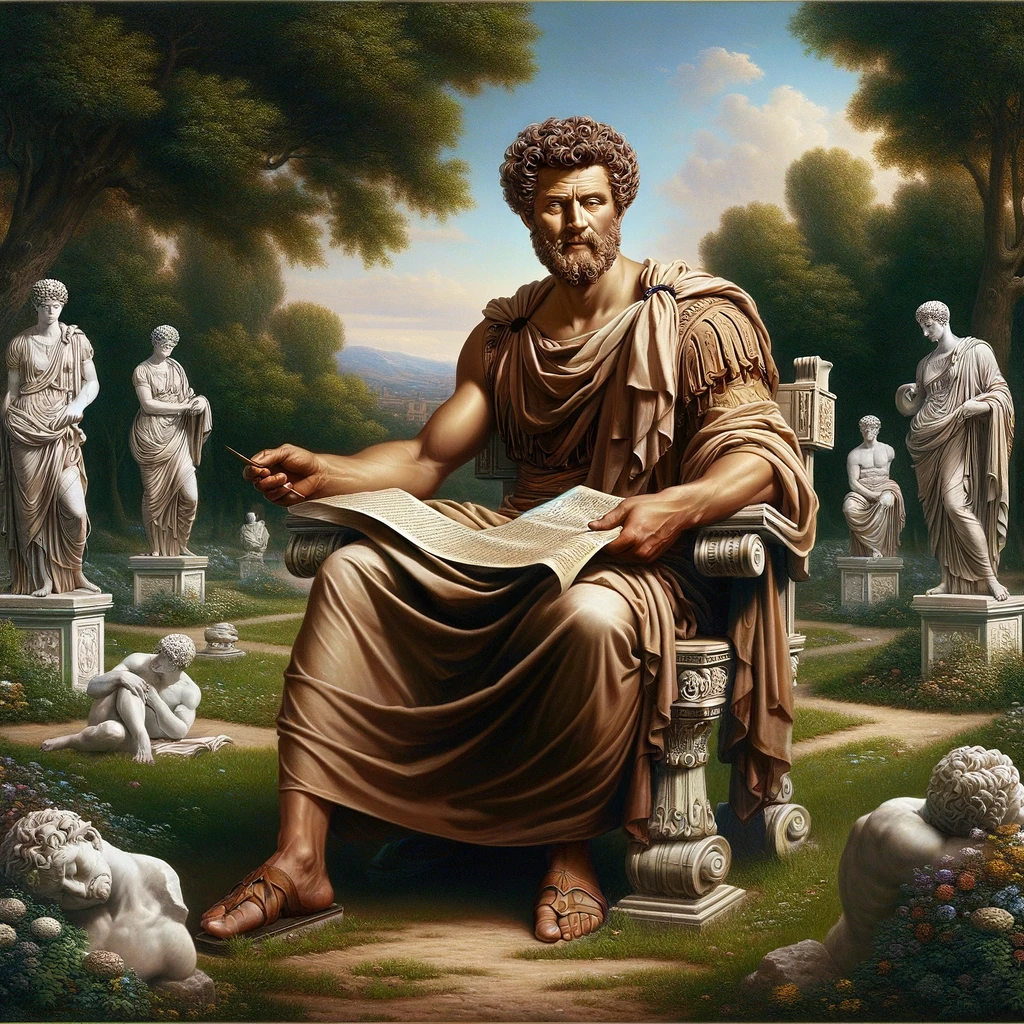
- “Never esteem of anything as profitable, which shall ever constrain thee either to break thy faith, or to lose thy modesty.”
- Grammar Focus: Use of modal verbs (“shall”) to express strong conviction and command. The subjunctive mood (“esteem”) indicates a hypothetical or non-real situation, enhancing the philosophical depth.
- “If they mean profitable to man as he is a rational man, stand thou to it, and maintain it; but if they mean profitable, as he is a creature, only reject it.”
- Grammar Focus: Conditional clauses (“If they mean”) guide the logical structure of the argument. The imperative form (“stand thou to it, and maintain it”) serves to direct action based on the condition.
- “All things are ranked together, and by that decency of its due place and order that each particular doth observe, they all concur together to the making of one and the same cosmos or world.”
- Grammar Focus: Complex sentence structure with multiple clauses. The use of passive voice (“are ranked”) emphasizes the involuntary or natural ordering of things.
- “For it is not lawful, that anything that is of another and inferior kind and nature, be it what it will, as either popular applause, or honour, or riches, or pleasures; should be suffered to confront and contest as it were, with that which is rational, and operatively good.”
- Grammar Focus: Subjunctive mood (“be it what it will”) used to discuss hypothetical scenarios. The semi-colon punctuates a list of examples, illustrating stylistic variety.
- “Now, that they say is best, which is most profitable. If they mean profitable to man as he is a rational man, stand thou to it, and maintain it.”
- Grammar Focus: Relative clauses (“that they say is best”) identify and define the subject. The use of “thou” reflects the formal and archaic tone typical of Aurelius’ era.
- “Why should it be feared by any? Is not this according to nature? But nothing that is according to nature can be evil.”
- Grammar Focus: Rhetorical questions engage the reader and provoke thought. The use of negation (“nothing that is according to nature can be evil”) emphasizes philosophical principles.
- “Do thou therefore I say absolutely and freely make choice of that which is best, and stick unto it.”
- Grammar Focus: Imperative mood (“Do thou”) commands action. The adverbs “absolutely” and “freely” modify and strengthen the imperative, urging decisive behavior.
- “That which anything doth naturally incline unto, therein is his end.”
- Grammar Focus: Demonstrative pronouns (“That which”) introduce dependent clauses that explain philosophical concepts.
- “And as for life, whether for a long or short time he shall enjoy his soul thus compassed about with a body, he is altogether indifferent.”
- Grammar Focus: Conjunctions (“And as for”) introduce considerations or elaborations on a topic. The phrase “whether for a long or short time” introduces a conditional aspect to the statement.
- “And which is chiefest of all, he shall live without either desire or fear.”
- Grammar Focus: Superlative form (“chiefest”) highlights the utmost importance of the concept. The use of “either… or” structures the alternatives faced in philosophical contemplation.
“Purchase ‘Babel’ now on Shopee and enjoy a free shipping discount with our exclusive Class Coupon! Shopee is an authorized partner offering low-priced books, ensuring you get genuine and affordable reading material. Don’t miss this opportunity to explore this best-selling classic literature at a great price. Shop today and dive into a world of infinite possibilities!”
“The Life and Adventures of Robinson Crusoe” Book Summary
Robinson Crusoe by Daniel Defoe is a seminal work in English literature, often credited as marking the beginning of realistic fiction as a literary genre. The novel narrates the life and adventures of Robinson Crusoe, a young man from York who harbors dreams of sea voyages. Despite his family’s pleas to pursue a more conventional life, Crusoe’s yearning for the sea is irrepressible. His first voyage out of England ends disastrously, but instead of returning home, Crusoe embarks on another expedition that leads to his shipwreck on a desolate island.
Marooned on the island near the Orinoco River for 28 years, Crusoe’s story unfolds through his personal reflections, which encompass survival tactics, self-discovery, and spiritual introspection. Initially desolate, Crusoe gradually adapts to his solitary life, meticulously documenting his daily activities which include securing food, crafting a shelter, and defending himself against potential threats. He tames goats, grows corn, and fashions pottery, all the while wrestling with loneliness and despair.
Crusoe’s life on the island takes a dramatic turn when he discovers another human footprint, leading to the rescue of a native whom he names Friday. This relationship evolves from one of master and servant to a deep friendship, providing Crusoe with companionship and a new perspective on his existence.
Defoe’s narrative is rich in detail, illustrating not only the physical challenges of Crusoe’s existence but also his psychological and spiritual development. The novel explores themes of civilization versus savagery, the importance of repentance, and the influence of providence, which ultimately leads Crusoe to view his isolation not as a punishment but as a providential occurrence meant to transform him.
Robinson Crusoe is not just an adventure story; it is also a moral and philosophical reflection on life, isolation, and human resilience. The detailed depiction of Crusoe’s survival techniques, his adjustments to island life, and his eventual rescue reflects both the Age of Exploration and the birth of the modern realist novel.

- “I was born in the year 1632, in the city of York, of a good family, though not of that country.”
- Grammar Focus: Simple declarative sentence. Uses a prepositional phrase “in the year 1632” to specify time and “in the city of York” to specify place, illustrating how contextual details can be compactly delivered.
- “Being the third son of the family, and not bred to any trade, my head began to be filled very early with rambling thoughts.”
- Grammar Focus: Compound sentence structure. The participial phrase “Being the third son of the family” acts as an adjectival modifier providing a causal background to the main action.
- “He told me it was for men of desperate fortunes on one hand, or of aspiring, superior fortunes on the other, who went abroad upon adventures.”
- Grammar Focus: Complex sentence with multiple clauses. Uses coordination (parallel structure) to contrast different types of adventurers, enhancing the rhythmic quality of the sentence.
- “The ship was no sooner out of the Humber, but the wind began to blow, and the waves to rise in a most frightful manner.”
- Grammar Focus: A variation of a correlative conjunction structure (“no sooner…but”) that introduces a cause immediately followed by its effect, enhancing the dramatic tension.
- “I had great reason to consider it as a determination of Heaven, that I should be thus driven into the arms of the ocean.”
- Grammar Focus: Complex sentence with a subordinate clause introduced by “that” indicating perception. Reflects the character’s belief in divine providence through the structure of the sentence.
- “Thus I was left to my reflection, which indeed was not very comfortable.”
- Grammar Focus: Simple sentence with an appositive phrase enhancing the meaning of “reflection,” adding emotional depth.
- “The prospect of dying from hunger or being eaten by wild beasts was much less dreadful to me than the thoughts of falling into the hands of savages.”
- Grammar Focus: Comparative structure using “less…than” to weigh fears against each other, showing Crusoe’s priorities and state of mind.
- “I walked about the shore lifting up my hands, and my whole being, as I may say, wrapped up in the contemplation of my deliverance.”
- Grammar Focus: Complex sentence with the participle phrase “lifting up my hands” acting as a continuous action during the main action, enhancing the vividness of the narrative.
- “Thus, after having, by my temerity, forfeited all claim to divine protection, I found myself as a creature driven and derelict.”
- Grammar Focus: Complex sentence structure with an absolute phrase “having, by my temerity, forfeited all claim to divine protection” providing causal information about his state of being “as a creature driven and derelict.”
- “Such is the uneven state of human life.”
- Grammar Focus: Simple declarative sentence summarizing a philosophical reflection, serving as a thematic statement about life’s unpredictability.
Purchase Robinson Crusoe now on Shopee and enjoy a free shipping discount with Class Coupon when buying one of the most famous classic pieces of literature ever made! Shopee is an authorized partner of Class Coupon offering low-priced books, ensuring you get genuine and affordable reading material. Don’t miss this opportunity to explore this best-selling classic literature at a great price. Shop today and dive into a world of infinite possibilities!”

